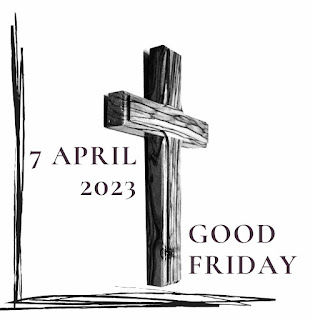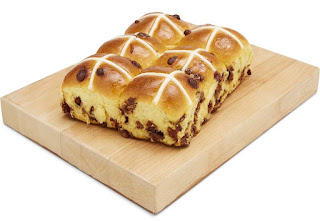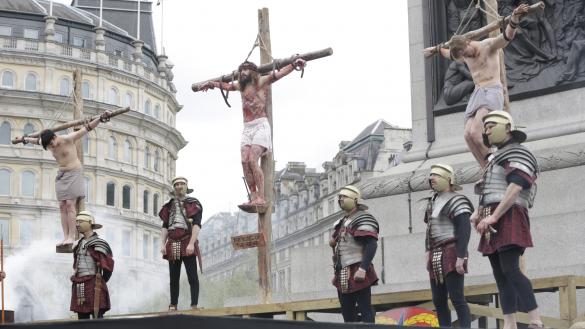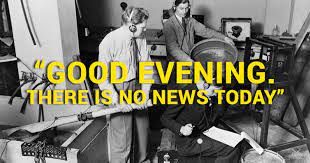__________
Good Friday can take place any day between March 20 and April 23.
Since Easter is a "moveable feast," Good Friday similarly shifts dates from year to year. It all comes down to the lunar calendar, specifically the first full moon to take place after the spring equinox. Good Friday is celebrated the following Friday, with Easter Sunday just after it.
__________
Hot cross buns are considered good luck.
These sweet, dense treats traditionally baked on Good Friday to be enjoyed on Easter Sunday are said to be imbued with good luck. Superstitions say that buns baked on this day will never spoil, protect against shipwrecks and even shield your home from fire.
The bun marks the end of the Christian season of Lent and different parts of the hot cross bun have a certain meaning, including the cross representing the crucifixion of Jesus, the spices inside signifying the spices used to embalm him at his burial and sometimes also orange peel to reflect the bitterness of his time on the cross.
According to an old legend, people who share a hot cross bun will remain good friends for a year if they say a special rhyme while enjoying the treat: "Half for you and half for me, between us two shall goodwill be."
Hot Cross Buns! Hot Cross Buns!
One a penny, two a penny, Hot Cross Buns!
If you don’t have daughters, then give them to your sons,
One a penny, two a penny, Hot Cross Buns!
__________
Some Irish Good Friday superstitions:
Getting a haircut on Good Friday prevents headaches for the rest of the year.
A child born on Good Friday and baptised on Easter Sunday was said to have the gift of healing. If it was a boy, it was expected that he would enter the ministry and attain a high position in the church.
If a person should die on Good Friday and was buried on Easter Sunday, he or she was sure of immediate entry into Heaven.
Eggs laid on Good Friday were marked with a cross and each member of the family ate one of these on Easter Sunday. Eggs set to hatch on this day were said to produce healthy birds.
No one would move house or begin any important business.
No blood could be shed which meant that animals or birds could not be slaughtered.
No one could work with wood or burn it, and no nail could be driven.
No fishing boats went to sea, and all fishing nets or lines were left idle. On the east coast, boats in the harbor would be left lying towards the quay wall and, in coastal communities everywhere, the residents gathered shellfish and edible seaweed which they ate as their main meal.
__________
You can watch a play for free in London.
Every year, the open-air play The Passion of Jesus is put on in London's Trafalgar Square for free. If you can't make it across the pond for the occasion, watch via a live stream on Facebook.
__________
On Good Friday in 1930, there was no news.
On a particularly slow news day in 1930, BBC radio announced, "There is no news." Listeners then heard piano music for the rest of the day.
According to fact checking website snopes.com:
As always, the more interesting element of this item is to understand the context behind it.Back in the 1930s, both broadcast radio and the BBC were in still their infancy, having begun only in the previous few years. As the BBC's program index from April 18, 1930, shows, programming in that era was quite limited and sparse.A mere 15 minutes was devoted to reporting the news of the day back then. That was because, in large part, the ability of radio stations to cover news outside of their local areas was quite limited, leaving them heavily dependent upon wire services and government announcements for news content. On a day when no government announcements were forthcoming and little of interest was moving across the news service wires, radio programmers might very well have felt that there was "no news" worth relaying to their audience.
__________
Commercials are banned in New Zealand.
According to the Broadcasting Act, TV and radio ads are prohibited between 6 a.m. and noon on Good Friday in New Zealand, out of respect for the religious day of observance. The same law holds true on Christmas, Easter Sunday and Anzac Day so as not to disrupt celebrations.
__________
The origin of the name "Good Friday"
'Good Friday' comes from the sense 'pious, holy' of the word "good". Less common examples of expressions based on this obsolete sense of "good" include "the good book" for the Bible, "good tide" for "Christmas" or Shrovetide, and Good Wednesday for the Wednesday in Holy Week.
A common folk etymology incorrectly analyses "Good Friday" as a corruption of "God Friday" similar to the linguistically correct description of "goodbye" as a contraction of "God be with you".
In Old English, the day was called "Long Friday" and equivalents of this term are still used in Scandinavian languages and Finnish.
__________
There is typically no Mass celebrated this day.
Traditionally, there is no Mass or celebration of the Eucharist on Good Friday. Instead, a prayer service, stations of the cross or other prayerful observation takes its place. The absence of the Eucharist honours the Passion and death of Jesus Christ.
__________
The Thursday before is also celebrated.
The Thursday before Good Friday is known as Holy Thursday or Maundy Thursday — deriving from the Latin word mandatum, meaning commandment. This symbolises the commandment given by Jesus at the Last Supper, in which he celebrated Passover with his disciples.
__________
As is the following Saturday
The Saturday after Good Friday and before Easter Sunday is known as Holy Saturday. The entire week before Easter, which starts on Palm Sunday the previous week, is called Holy Week. It's an opportunity for Christians and Catholics to prepare for Easter with prayer, reflection and maybe a little cooking and shopping.













No comments:
Post a Comment
Note: Only a member of this blog may post a comment.